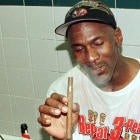We're now more than halfway done with "The Last Dance," the 10-part documentary series covering Michael Jordan and the 1997-98 Chicago Bulls. The title comes straight from Phil Jackson, who ahead of the season called that campaign "The Last Dance" because management had made it clear it was their final run together.
GM Jerry Krause said publicly that it would be Jackson's last year coaching the team, and Jordan had established that if Jackson wasn't there, he wouldn't be either. And as expected, after they beat the Utah Jazz in 1998 to win their sixth title, all the key figures parted ways.
Jackson wasn't brought back, Scottie Pippen was traded to the Houston Rockets and Jordan retired for the second time. With everything that had transpired, Jordan walking away after the second three-peat wasn't a surprise. But was a lesser-known incident responsible for sealing that fate?
In an excerpt from Krause's unfinished and unpublished memoirs that his family decided to share with NBC Sports Chicago, the late GM details a nasty injury Jordan suffered while fooling around with a cigar cutter after the 1998 season.
To his everlasting credit, at the end of his time with the Bulls he could have really screwed the franchise big time and he didn't. In the summer after winning the last championship he'd cut his index finger of his shooting hand very badly with a cigar cutter. It was seriously questionable if he could regain enough movement in the finger to be himself again as a shooter. He could have easily put us in an extremely tough situation by saying he wanted to play and force us to sign him to the biggest contract in team sports history. It would then have been easy to go on the disabled list with the finger injury and spend the rest of that strike-shortened season picking up checks every two weeks and not playing at all. But Michael being Michael, once he signed a contract, he gave you a thousand percent effort and would not think of stiffing you.
Krause, being the shrewd negotiator he was, frames it in terms of a potentially record-setting contract, and how an injured Jordan returning to the Bulls would have impacted the franchise. That being his most lasting thought about the accident gives you some insight into why he wasn't always the easiest guy to get along with.
But Krause digression aside, it's worth at least wondering how this might have impacted Jordan's decision to retire. At the time of the injury, he said he had already made his mind up. Via the New York Daily News:
"Hopefully, it doesn't alter my golf game," Jordan said. "But my decision was made before this happened, and from what doctors have told me, that even if I chose to play, I wouldn't be able to play for two months. But that never had any factors in terms of my decision."
There's likely a lot of truth to that. He was nearly 15 years into his career, had played a lot of games, won six titles and was fed up with Bulls management. But as Krause notes, he was in a position to make an extreme sum of money, and we know Jordan has never been shy about cashing checks. At the same time, we also know he's something of a perfectionist.
During episode six of "The Last Dance," there's a scene where Jordan is driving in his car and talking to Ahmad Rashad, and muses about how while some players want to play until they physically can't do it anymore, he'd rather go out on top. In a similar vain, he once told Wright Thompson of ESPN that he always thought about dying young because he simply couldn't imagine being old. He couldn't picture a time where he wasn't "Michael Jordan."
"I … I always thought I would die young," he says, leaning up to rap his knuckles on the rich, dark wood of his desk.
He has kept this fact a secret from most people. A fatalist obsession didn't go with his public image and, well, it's sort of strange. His mother would get angry with him when he'd talk to her about it. He just could never imagine being old. He seemed too powerful, too young, and death was more likely than a slow decline. The universe might take him, but it would not permit him to suffer the graceless loss and failure of aging. A tragic flaw could undo him but never anything as common as bad knees or failing eyesight.
So was Jordan probably always leaning toward leaving after the '98 season? Yes, but through this lens it's easy to see how that accident with the cigar cutter finalized that decision. It's also worth noting that the incident happened before his official retirement announcement in January of 1999. If there were any doubts about whether he could still be the best player, it was easier to just walk away with the rings and the glory than risk returning the next season as a lesser version of himself.


















